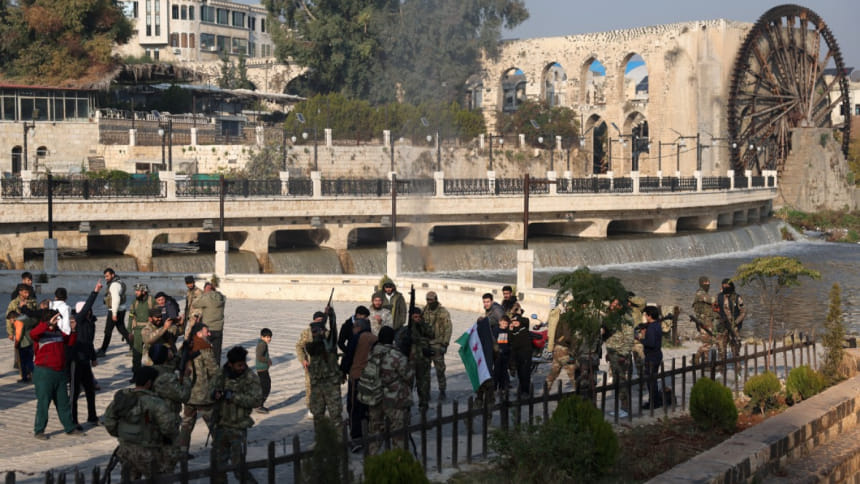Turkey, Russia and Iran meet in Doha seeking exit from Syria chaos
Turkey’s foreign minister will meet with his Russian and Iranian counterparts in Doha on Saturday to try to find a solution to the renewed fighting in Syria and avoid chaos on its doorstep.
The three countries have been partners since 2017 in the Astana process seeking to end the civil war in Syria even if they have supported opposite sides on the battlefield.
Moscow and Tehran have offered military support to help President Bashar al-Assad crush the opposition.
Meanwhile Ankara, without being directly involved, has supported various rebel movements and looked on their recent lightning advances favourably.
“For Ankara, there is both opportunity and risk in Syria’s changing balance of power,” said Hamish Kinnear, an analyst at consultants Verisk Maplecroft.
Turkish President Recep Tayyip Erdogan, who this week called on Assad to “reconcile with his people”, said Friday he “hoped the advance of the rebels would continue without incident”, openly identifying their objective as Damascus.
Turkey is no simple bystander, sharing a 900-kilometre (560-mile) border with Syria and hosting nearly three million Syrian refugees.
For the moment, “the precise role of Turkey in this situation remains a topic of speculation,” said Omer Ozkizilcik, a researcher in Ankara linked to the Atlantic Council.
“But what is clear is that without being directly involved, Turkey gave its green light to the offensive,” he said.
– ‘Complicated relations’ –
Even if Ankara’s relations are traditionally “complicated” with the Islamist group Hayat Tahrir al-Sham (HTS) spearheading the offensive, the Turkish government was clearly aware of the preparations, Ozkizilcik added.
The most important thing for Turkey “is stability in Syria and a safe area to which Syrian refugees can return,” said Gonul Tol, Turkey director of the Middle East Institute in Washington.
Erdogan is no longer insisting on the full removal of the Assad regime which would create a void that would benefit the Islamic State group and Kurdish militants, she said.
Assad has rejected Erdogan’s recent attempts to meet, insisting that beforehand Turkish forces must leave the northwest of Syria, where they are deployed to fight Kurdish forces.
Assad’s refusal to meet Erdogan has even irritated Russian President Vladimir Putin, Tol said.
– Power vacuum –
“Assad managed to piss everyone off, including Iranians and Russians and Turks, everyone, because he has been dragging his feet on efforts to reach a deal with both Turkey and others,” she said.
Turkey and Russia could seek to promote a transition government without Assad but with some elements of his regime and the opposition, she said.
Iran, for its part, is irked by the lack of support shown by Assad after the death of Hezbollah leader Hassan Nasrallah, whose forces had come to Assad’s aid during the civil war.
The Qatar meeting — which brings together Russia’s Sergei Lavrov, Turkey’s Hakan Fidan, and Iran’s Abbas Araghchi — could signal the end of Assad in power, the experts say.
As a former head of Turkish intelligence, Fidan is well versed in Syrian affairs and knows all the key players, said Sinan Ulgen, an analyst with Carnegie Europe in Ankara.
LondonGBDESK//



Comments are closed.